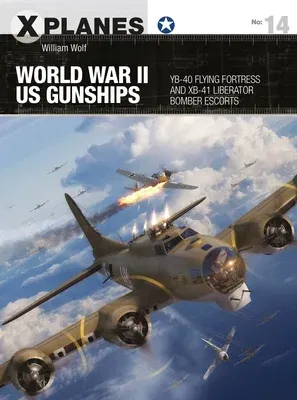Before the P-51 Mustang, the USAAF planned to use heavily-armed
converted Flying Fortresses and Liberators to escort the Eighth Air
Force's formations over Germany. This is the first history of their
development, role, and failure, by an expert USAAF historian.
The XB-40 and XB-41 were secret, little-known experimental modifications
of the B-17F and B-24D, respectively, into heavily-armed bomber gunships
variously referred to as "convoy protector airplanes," "bomber
escorters," or "destroyer escort planes." These aircraft were developed
during the early war in response to the lack of a USAAF long-range
fighter aircraft able to escort and protect beleaguered regular B-17
formations from the UK round trip deep into Germany. Unfortunately,
these "protecters" were found to be unable to protect large formations
as expected. During their construction each encountered numerous delays
in the development and delivery of their various armament additions and
improvements, particularly the Bendix chin turret. Being modifications
of the bomber, they were to protect; after the addition of guns and
ammunition they became overweight and also markedly tail-heavy causing
center of gravity problems. The result of these alterations were
protectors that did not have the performance of the bombers they were to
protect. After releasing their bombs, a standard B-17F formation
returning from a mission easily outpaced their overloaded escort
protectors that carried no bombs. The YB-40 participated in only 14
lackluster operational service test missions during mid-1943 before
being withdrawn from service. The XB-41 Liberator was a one-of-a-kind
bomber escort which had similar problems as the XB-40 but never saw
operational testing before also being cancelled for its poor comparative
performance to standard bombers.
Over the past 75 years both the XB-40 and XB-41 have been chronicled in
only a few rehashed magazine and online articles. Using many formerly
classified documents from his large microfilm collection, in this book
William Wolf presents their previously unpublished history. It describes
in depth for the first time the politics and development and associated
problems of both escorter types. The armament of each is described and
depicted in detail, and the YB-40's operational service test missions
are recounted from 92BG/327BG records. The history of these two
escorters is described in the context of the USAAF's strategic bombing
and concurrent fighter escort developments and undertakings during the
European air war.

